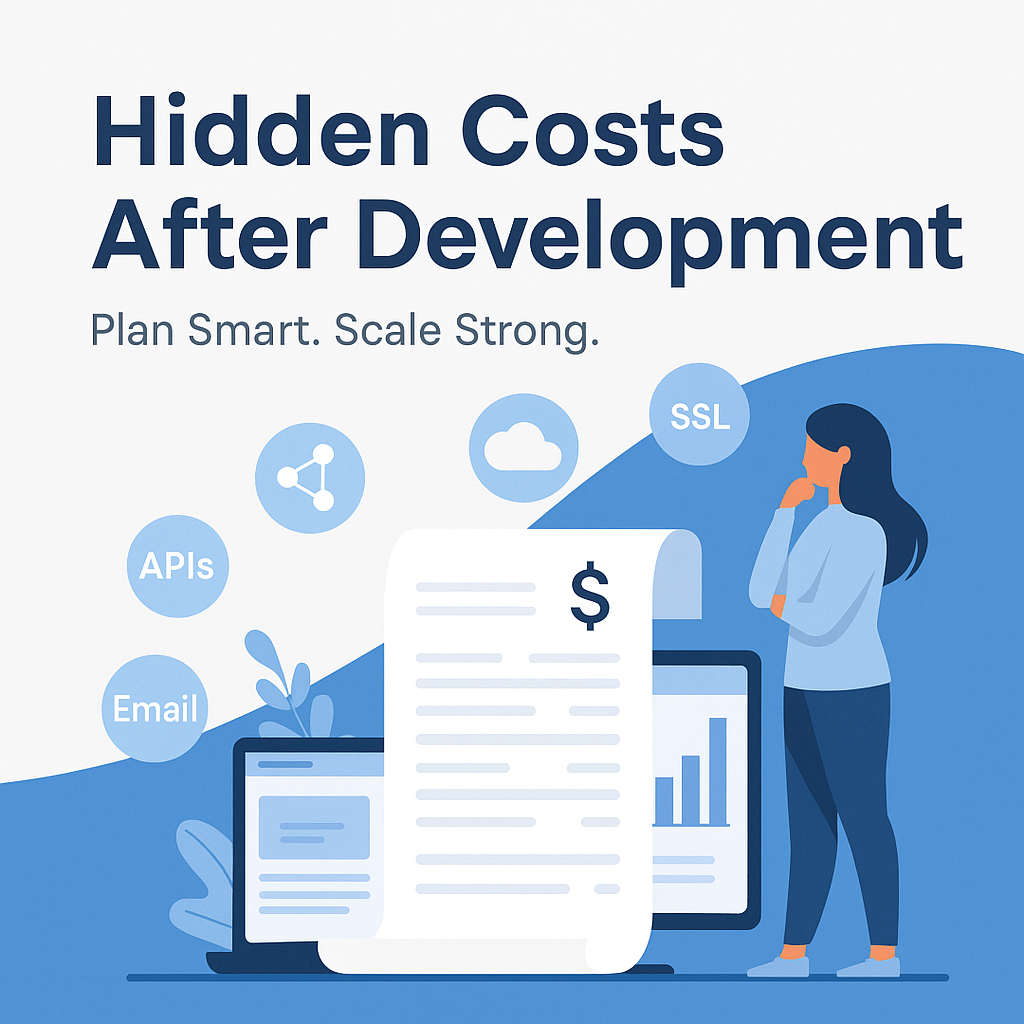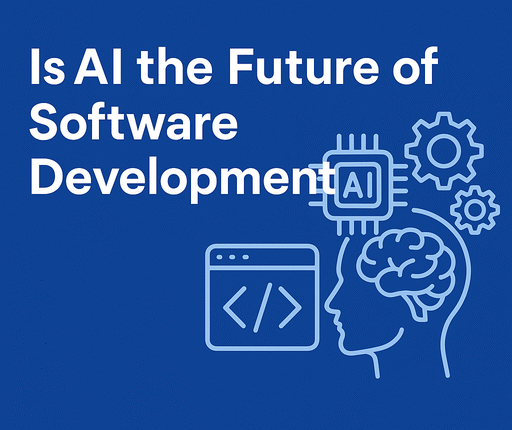From hosting fees to API integrations and security, discover the hidden costs that follow software development—and how to budget for long-term success. When you’re budgeting for your next digital product—whether it’s a website, mobile app, or enterprise software—development and maintenance are major line items. But they’re not the only ones. At Vedx Solution, we believe in transparent communication and complete clarity about all potential costs. Here’s a comprehensive list of additional charges clients may encounter—based on the type and scale of your project. ✅Domain Name Registration & Renewal Description: The unique name of your website (e.g., yourbusiness.com). Standard domain: $10 – $20/year Premium domain: $100 – $5,000+ (one-time or annually depending on value) 🔹 Pro Tip: Buy for 2–5 years upfront to avoid renewal issues and SEO ranking dips. ✅Web Hosting / Server Costs Description: Hosting is the server space where your website or app files live. Hosting Type Monthly Cost (USD) Notes Shared Hosting $5 – $15 Suitable for small websites VPS Hosting $20 – $80 Better performance & control Dedicated Server $100 – $500+ High performance, isolated server Cloud Hosting (AWS, Azure, GCP) $30 – $500+ Scalable with pay-as-you-go model 🔹 Pro Tip: Most startups and mid-sized apps prefer AWS or DigitalOcean with autoscaling. ✅SSL Certificate (HTTPS Security) Description: Secures your site and builds user trust. Basic SSL (Let’s Encrypt): Free Premium SSL (Wildcard, EV): $50 – $300/year 🔹 Mandatory for eCommerce, login-based platforms, or any form submissions. ✅Third-Party API Fees Description: Tools and integrations that enhance features. Examples: API Type Common Providers Typical Monthly Cost Maps & Location Google Maps $10 – $200+ (usage-based) Payment Gateways Stripe, PayPal, Razorpay 2.9% – 3.5% per transaction SMS/Email Twilio, SendGrid $20 – $200+ CRM Integration Salesforce, HubSpot $50 – $300/user/month AI/ML APIs OpenAI, AWS AI $20 – $500+ 🔹 Pro Tip: Always confirm pricing for high-volume APIs to avoid surprise costs. ✅App Store / Play Store Accounts For mobile apps, publishing requires developer accounts: Google Play Developer Account: $25 (one-time) Apple Developer Account: $99/year 🔹 Apple requires annual renewal and may reject apps without proper functionality or compliance. ✅Email & Messaging Services Description: For domain-based business email and transactional messages. Service Provider Monthly Cost Business Email Google Workspace, Zoho $6 – $18/user/month Bulk Email SendGrid, Mailchimp $15 – $200+ (based on volume) In-App Messaging Twilio, Firebase Usage-based, starting at $15/month ✅CDN (Content Delivery Network) Description: Speeds up loading for users across different geographies. Cloudflare Free Plan: $0 Pro/Business Plans: $20 – $200+/month AWS CloudFront / Akamai: Usage-based, often starting around $30/month ✅SEO & Digital Marketing (Optional but Crucial) Service Cost (USD) Notes SEO Audit & Setup $100 – $500 one-time Keyword research, on-page setup Monthly SEO Retainer $300 – $2,000/month Depends on goals & geography Paid Ads Variable Platform-based (Google, Meta) 📌 Summary: Additional Costs Snapshot Item Estimated Cost Domain Name $10 – $20/year Hosting / Cloud $5 – $500/month SSL Certificate Free – $300/year APIs & Integrations $10 – $500+/month App Store Accounts $25 – $99/year Email Services $6 – $200/month CDN $0 – $200/month SEO & Marketing $100 – $2,000+/month UI/UX Tools Free – $45/month Documentation & Training $100 – $1,000 one-time 💡 Why Vedx Solution Shares This We strongly believe in building trust through transparency. Knowing these costs helps you: Plan your total budget realistically 💡 Prevent unexpected billing ❌ Scale with confidence 📈 We’re not just here to develop your solution—we’re here to guide you at every step, from idea to execution and beyond. Need Help Planning a Project Budget Let’s connect. We’ll help you estimate every cost with no hidden surprises. Contact us
In today’s fast-moving tech world, AI is reshaping software development—from automating code to predicting bugs and even suggesting architecture. But here’s the truth: AI isn’t replacing developers—it’s reshaping their role. While artificial intelligence offers speed and scale, human developers still hold the creative and strategic edge. In this blog, we’ll take a real-world look at how AI helps, where it falls short, and why experienced minds still matter more than ever. 🤖 How AI is Transforming Software Development AI has become more than a trend. From GitHub Copilot to no-code platforms and automated testing, AI tools are becoming part of everyday workflows. Practical Ways AI is Used in Development: Code completion & generation – Speeds up writing repetitive or boilerplate code Automated bug fixing – Suggests potential fixes in real-time Smart test creation – Generates unit test cases to save QA time Code reviews – Highlights potential issues before merge NLP to Code – Turns text instructions into executable code (to an extent) These tools are great for productivity. But here’s the catch – they don’t think, adapt, or understand like humans. 🚫 Limitations of AI in Software Development Despite the hype, AI has clear boundaries. Here are the critical limitations businesses must understand: 1. Lacks Business Context AI doesn’t understand: Your market Your users Your business goals It can’t tailor software to real-world use cases like an experienced developer. 2. Security Risks AI-generated code may: Miss essential validations Leave loopholes in authentication Ignore GDPR, HIPAA, or other compliance needs 3. Not Built for Architectural Thinking AI cannot: Plan long-term scalability Make tradeoffs between performance vs. cost Align backend decisions with user experience 4. Fails in Edge Cases AI breaks down when: Requirements are vague Real-time decisions are needed There’s a deviation from training data 5. Quality and Maintainability Are Hit or Miss Even if the code runs: It might not follow best practices It could be hard to read, scale, or refactor It usually needs manual clean-up Hire Expert Developer 👨💻 Why Human Developers Still Have the Edge Here’s what truly separates skilled professionals from automated tools: 1. Creative Problem Solving From debugging a critical API issue to designing a flawless user experience, creative thinking is irreplaceable. 2. Understanding People, Not Just Code Human developers: Consider business logic Adapt to user behavior Build with empathy and ethics 3. Ownership & Collaboration AI can suggest code, but: It doesn’t take responsibility It can’t collaborate in meetings, sprints, or retros It can’t pivot when the roadmap changes 4. Strategic Decision Making Great developers: Choose the right tech stack Avoid overengineering Balance cost, time, and future scalability 5. Security, Compliance & Legal Awareness Skilled teams think about: How personal data is stored Where legal risks lie How to design for trust 🔄 Where AI and Humans Work Best—Together The future isn’t about replacing developers—it’s about helping them work smarter. At Vedx Solution, we embrace the best of both: How We Use AI (Responsibly): Speed up internal coding for repetitive tasks Generate test cases and documentation Support faster code reviews and QA checks Optimize legacy systems for better performance But every project is reviewed, tested, and guided by real humans—who understand your vision, your users, and your business. 🏆 Real Innovation Comes from Human Intelligence AI is a tool, not a solution. Real value is built when: Code reflects real business needs Products are built with vision, not just speed Teams collaborate, adapt, and improve every sprint At Vedx Solution, our developers combine smart tools with smarter thinking. From planning to post-launch, we bring human strategy to digital innovation. Contact us
Hiring the right developer can make or break your project. Whether you’re building a new app, improving your website, or scaling your tech team, knowing how to hire a developer who fits your goals is essential. In this guide, Vedx walks you through the process—from sourcing software developers to vetting their skills—so you can confidently hire a dedicated developer that matches your budget and business needs. 🚀 Why Hiring the Right Developer is Crucial The right developer does more than write clean code—they bring your vision to life, ensure user satisfaction, and contribute to long-term product scalability. A wrong hire, on the other hand, can lead to: Buggy applications Missed deadlines Budget overruns That’s why understanding the developer hiring process is key—especially if you’re exploring remote developer hiring or choosing between a freelancer vs full-time developer. 🧭 Where Should You Start? Sourcing Software Developers Finding skilled developers can feel overwhelming, especially if you’re not from a technical background. Here are some effective sourcing methods trusted by the Vedx team: Freelance platforms (Upwork, Toptal, Fiverr): Ideal for MVPs or short-term deliverables Developer communities (GitHub, Stack Overflow, Dev.to): Great for finding engaged, experienced talent Recruitment agencies: Recommended for bulk hiring or when you need vetting support Job boards (LinkedIn, AngelList, We Work Remotely): Work well for both freelancers and full-time roles Referrals: Tap into your network—it’s often the most efficient and trustworthy channel 💡 Vedx Tip: On a tight budget? Start with freelancers and internal referrals. 🔍 What to Look for in a Software Developer When you’re screening candidates, look beyond the buzzwords and focus on these five core attributes: Technical Skills – Do they have hands-on experience with your stack or framework? Portfolio – Real-world projects are more telling than certifications Problem-Solving Ability – Can they think critically and independently? Communication – Essential for remote work and agile development Cultural Fit – Will they integrate well with your team’s workflow and values? At Vedx, we emphasize not just tech capabilities, but also adaptability and alignment with your project’s mission. 🆚 Freelancer vs Full-Time Developer: What’s Right for You? Here’s a direct comparison to help you decide based on your project needs: Criteria Freelancer Full-Time Developer Cost Generally lower Higher upfront investment Commitment Project-based Long-term team member Flexibility High Moderate Onboarding Minimal Requires time for integration Best For MVPs, small feature rollouts Product scaling, long-term roadmaps For lean startups, freelancers are often ideal. For sustainable scaling, full-time developers provide greater continuity. ⚠️ Common Mistakes to Avoid When Hiring Developers Hiring the right developer can make or break your project. Whether you’re building a new app, improving your website, or scaling your tech team, knowing how to hire a developer who fits your goals is essential. In this guide, Vedx walks you through the process—from sourcing software developers to vetting their skills—so you can confidently hire a dedicated developer that matches your budget and business needs. 🚀 Why Hiring the Right Developer is Crucial The right developer does more than write clean code—they bring your vision to life, ensure user satisfaction, and contribute to long-term product scalability. A wrong hire, on the other hand, can lead to: Buggy applications Missed deadlines Budget overruns That’s why understanding the developer hiring process is key—especially if you’re exploring remote developer hiring or choosing between a freelancer vs full-time developer. 🧭 Where Should You Start? Sourcing Software Developers Finding skilled developers can feel overwhelming, especially if you’re not from a technical background. Here are some effective sourcing methods trusted by the Vedx team: Freelance platforms (Upwork, Toptal, Fiverr): Ideal for MVPs or short-term deliverables Developer communities (GitHub, Stack Overflow, Dev.to): Great for finding engaged, experienced talent Recruitment agencies: Recommended for bulk hiring or when you need vetting support Job boards (LinkedIn, AngelList, We Work Remotely): Work well for both freelancers and full-time roles Referrals: Tap into your network—it’s often the most efficient and trustworthy channel 💡 Vedx Tip: On a tight budget? Start with freelancers and internal referrals. 🔍 What to Look for in a Software Developer When you’re screening candidates, look beyond the buzzwords and focus on these five core attributes: Technical Skills – Do they have hands-on experience with your stack or framework? Portfolio – Real-world projects are more telling than certifications Problem-Solving Ability – Can they think critically and independently? Communication – Essential for remote work and agile development Cultural Fit – Will they integrate well with your team’s workflow and values? At Vedx, we emphasize not just tech capabilities, but also adaptability and alignment with your project’s mission. 🆚 Freelancer vs Full-Time Developer: What’s Right for You? Here’s a direct comparison to help you decide based on your project needs: Criteria Freelancer Full-Time Developer Cost Generally lower Higher upfront investment Commitment Project-based Long-term team member Flexibility High Moderate Onboarding Minimal Requires time for integration Best For MVPs, small feature rollouts Product scaling, long-term roadmaps For lean startups, freelancers are often ideal. For sustainable scaling, full-time developers provide greater continuity. ⚠️ Common Mistakes to Avoid When Hiring Developers Even seasoned managers occasionally overlook key hiring principles. Watch out for these: Hiring Based on Resume Alone – Always assess technical skills through tests or live tasks Ignoring Soft Skills – Great code means little if collaboration breaks down Unclear Expectations – Set deadlines, KPIs, and communication protocols early Skipping Vetting Steps – Never skip interviews, test cases, or reviews At Vedx, our hiring methodology mitigates these pitfalls to ensure quality developer matches every time. 🧪 Vetting Developers: How to Do It Right Effective vetting leads to successful hiring. Here’s how we recommend doing it: Technical Assessments – Use platforms like HackerRank, Codility, or TestGorilla Code Review – Analyze previous projects for logic, structure, and documentation Live Coding Session – Test real-time problem-solving and communication Behavioral Interview – Evaluate their response to challenges, deadlines, and feedback At Vedx, we also assess culture fit and long-term vision alignment. 🧑💼 How to Evaluate Developers Without Being Technical Even non-technical founders can vet developers effectively. Here’s
In the world of software and application development, there’s a common assumption that once a project is “complete,” the job is done. The app is launched, the website is live, or the software is installed—mission accomplished, right? Wrong. In reality, development is just the beginning. Whether it’s a website, mobile app, custom software, or enterprise platform, maintenance is a critical and ongoing necessity. Without it, even the most well-built systems can quickly become outdated, insecure, or unusable. At Vedx Solution, we’ve seen how proper maintenance can make or break a project’s long-term success. Here’s why skipping maintenance is a risk you can’t afford—and how to do it right. 🔧 Why Maintenance Is Not Optional After Development After development is complete, the digital landscape doesn’t just stand still. Operating systems evolve, user expectations shift, and technology stacks are updated. Without regular maintenance, your product can quickly fall behind. Here’s why maintenance matters: 1. Bug Fixes & Patches Even after extensive testing, real-world usage often reveals unforeseen bugs or edge cases. Quick and continuous bug resolution is essential to ensure a seamless user experience. 2. Security Updates Cyber threats are constantly evolving. Security vulnerabilities can be discovered at any time, even in widely used frameworks and plugins. Regular updates and patches are essential to protect user data and maintain trust. 3. Platform Compatibility Browsers, mobile devices, and operating systems are updated frequently. What worked perfectly last month may not function as expected on the latest iOS or Chrome version. Maintenance ensures compatibility is always up-to-date. 4. Third-Party Service Changes APIs and third-party tools used during development may change, become deprecated, or even shut down. Your system must be updated accordingly to avoid service disruption. 5. Performance Optimization Over time, user load may increase, or new features may impact performance. Routine maintenance includes optimizing performance to handle growing demands and keep loading times fast. 6. User Feedback & UX Improvements Post-launch feedback offers valuable insights. Maintenance allows you to iterate on the user experience, fix pain points, and enhance usability based on real usage data. ⚠️ The Consequences of Ignoring Maintenance Failing to maintain your digital product doesn’t just stop progress—it invites regress. Here are some of the risks: 🔍 Types of Post-Development Maintenance Understanding the types of software maintenance helps businesses plan effectively. At Vedx Solution, we offer comprehensive services across four key categories: 1. Corrective Maintenance This involves fixing defects or errors reported after deployment. It includes bug fixing, crash recovery, and troubleshooting. 2. Adaptive Maintenance Changes in the environment—like OS upgrades or browser updates—require adjustments in the software. Adaptive maintenance ensures your system continues to work in these new environments. 3. Perfective Maintenance Over time, users may request improvements or new features. Perfective maintenance focuses on enhancing functionality, UI/UX, and system performance. 4. Preventive Maintenance This proactive approach involves code refactoring, system audits, and security updates to prevent potential issues before they occur. 🤝 How Vedx Solution Supports You After Development At Vedx Solution, we understand that development doesn’t end at launch—it evolves. That’s why we offer end-to-end maintenance and support services tailored to your business needs. Here’s how we help: ✅ SLA-Based Maintenance Plans We offer customizable Service Level Agreements (SLAs) that guarantee response times, issue resolution, and regular system updates—so you always know what to expect. ✅ Proactive Monitoring Our systems actively monitor uptime, performance, and security threats—allowing us to fix issues before they affect your users. ✅ Dedicated Support Team You get access to a skilled, responsive team who understands your platform and is ready to resolve issues quickly and effectively. ✅ Regular Health Checks & Audits We conduct periodic performance audits, security scans, and code reviews to ensure your systems remain fast, secure, and scalable. ✅ Continuous Improvement As your business evolves, so should your platform. We help implement enhancements, integrate new features, and ensure your digital product grows with you. 🧠 Final Thoughts: Software Is Never Truly “Done” Think of your software like a car—you wouldn’t drive it for years without oil changes or tune-ups. In the same way, websites, apps, and platforms need regular care to stay secure, functional, and aligned with business goals. Neglecting post-development maintenance is like leaving a building unattended—it will deteriorate over time, and eventually become unsafe or unusable. With Vedx Solution as your trusted partner, you’re not just getting a development team—you’re gaining a long-term ally dedicated to the growth, security, and performance of your digital assets. 📞 Ready to Future-Proof Your Software? Don’t wait for bugs or breakdowns to act. Let Vedx Solution help you maintain, optimize, and enhance your software long after launch. 👉 Contact us today to learn more about our post-development maintenance plans or schedule a free platform audit.
Artificial Intelligence (AI) is no longer just a buzzword in tech—it’s the driving force behind a seismic shift in how IT services are delivered, consumed, and managed. As we step deeper into 2025, AI continues to revolutionize the IT landscape, enabling smarter automation, enhanced security, and improved service delivery. But with great transformation comes new challenges. For businesses navigating this fast-changing digital terrain, partnering with the right IT service provider is crucial. Vedx Solution stands at the forefront of this AI-driven evolution, delivering intelligent, future-ready IT solutions designed to help businesses scale securely and efficiently. 🔍 The Role of AI in Modern IT Services AI is impacting nearly every facet of IT services—from routine operations to strategic decision-making. Here’s how: 1. Automated IT Operations (AIOps) AI-powered automation is transforming traditional IT operations. With AIOps platforms, tasks like incident detection, root-cause analysis, and system performance monitoring are now handled with minimal human intervention. Use Case: Instead of waiting for systems to crash and then responding, AI can proactively detect anomalies, alert support teams, and in some cases, auto-correct issues before they affect end-users. Vedx Solution leverages AIOps to help clients minimize downtime, optimize performance, and reduce operational costs. 2. AI in Cybersecurity Cyber threats in 2025 are more advanced, faster, and harder to detect. AI steps in by analyzing vast amounts of data in real time to detect patterns, predict potential threats, and trigger defensive responses. AI can identify zero-day vulnerabilities, flag insider threats, and even respond autonomously to some types of cyberattacks. With Vedx Solution, businesses benefit from AI-integrated cybersecurity systems that offer real-time protection, behavioral analysis, and rapid response mechanisms. 3. Intelligent Helpdesks Gone are the days of traditional IT support queues. AI-powered chatbots and virtual assistants are now handling level-one IT support tickets, resolving common issues instantly, and freeing human agents for more complex tasks. Vedx Solution’s Smart IT Helpdesk integrates conversational AI that provides users with 24/7 support—speeding up resolutions and improving user satisfaction. 4. Predictive Analytics for IT Management AI can now analyze historical and real-time data to forecast future IT needs—like when to scale up infrastructure, upgrade systems, or replace aging hardware. Vedx Solution’s predictive analytics tools help businesses plan proactively, avoid service disruptions, and optimize IT spending. 🧠 Opportunities AI Brings to IT Services ✅ 1. Enhanced Efficiency With AI managing repetitive and time-consuming tasks, IT teams can focus on strategic initiatives. This boosts overall productivity and allows businesses to respond faster to market demands. ✅ 2. Improved Decision-Making AI analyzes data at scale and uncovers insights that would otherwise go unnoticed. IT leaders can now make informed, data-driven decisions on infrastructure, application performance, and security. ✅ 3. Cost Savings Automation reduces the need for manual intervention and accelerates problem resolution. Over time, this results in significant cost savings in IT operations and support. ✅ 4. Scalability AI systems adapt to increased workloads without requiring proportional increases in human resources. This makes it easier for growing businesses to scale IT support. Vedx Solution helps organizations build scalable, AI-augmented IT ecosystems that grow alongside their business needs. ⚠️ Challenges in Implementing AI in IT Services While the benefits are compelling, organizations must navigate several challenges to successfully adopt AI: ❌ 1. Data Privacy & Compliance AI systems require large volumes of data to function effectively. This raises concerns around data security, privacy, and compliance—especially with regulations like GDPR and HIPAA. Vedx Solution ensures strict adherence to regulatory frameworks and implements robust data governance policies in all AI deployments. ❌ 2. Skills Gap AI implementation demands expertise in data science, machine learning, and software engineering—skills that many IT teams may lack. As part of its consulting and managed services, Vedx Solution bridges this skills gap by providing clients with access to experienced AI professionals and tailored training programs. ❌ 3. Integration Complexity Integrating AI with legacy IT systems can be technically complex and resource-intensive. Compatibility, data silos, and infrastructure readiness are major concerns. Vedx Solution offers a phased integration approach that ensures seamless adoption without disrupting existing operations. ❌ 4. Ethical and Bias Concerns AI systems can inadvertently reinforce biases present in training data, leading to skewed or unfair decision-making. Vedx takes an ethical AI-first approach—ensuring transparency, fairness, and accountability in every solution delivered. 🤝 Why Choose Vedx Solution as Your AI-Powered IT Partner? In 2025, it’s not just about keeping up with technology—it’s about staying ahead. That’s where Vedx Solution comes in. Here’s what sets Vedx apart: 🌐 Looking Ahead AI will continue to redefine what’s possible in IT services—making them smarter, faster, and more adaptive. However, to fully leverage its potential, businesses need a partner who not only understands the technology but also knows how to align it with your unique goals. Vedx Solution is more than a service provider—it’s your innovation partner in the AI era. Whether you’re just beginning your AI journey or looking to scale your current initiatives, Vedx is ready to help you reshape your IT strategy for the future.
When embarking on a new project, one of the crucial decisions you’ll face is how to structure your engagement with a service provider like VedX Solutions. Two common models emerge: dedicated resources and fixed-cost projects. Understanding the nuances of each can significantly impact your project’s success. Fixed-Cost Projects: Defined Scope, Defined Budget A fixed-cost project involves a pre-defined scope of work with a fixed budget. This model is ideal when your project requirements are well-defined, and you have a clear understanding of the deliverables. Pros: Cons: Dedicated Resources: Tailored Expertise, Flexible Engagement In contrast, a dedicated resource model provides you with a team of experts specifically assigned to your project. This model offers greater flexibility and control, making it suitable for complex or evolving projects. Benefits of Dedicated Resources: Why Choose Dedicated Resources with VedX Solutions? Choosing the Right Model: The best model for your project depends on your specific needs and priorities. In Conclusion: The flexibility and full control of resource and work implementation offered by dedicated resources are often a key factor for many companies.





